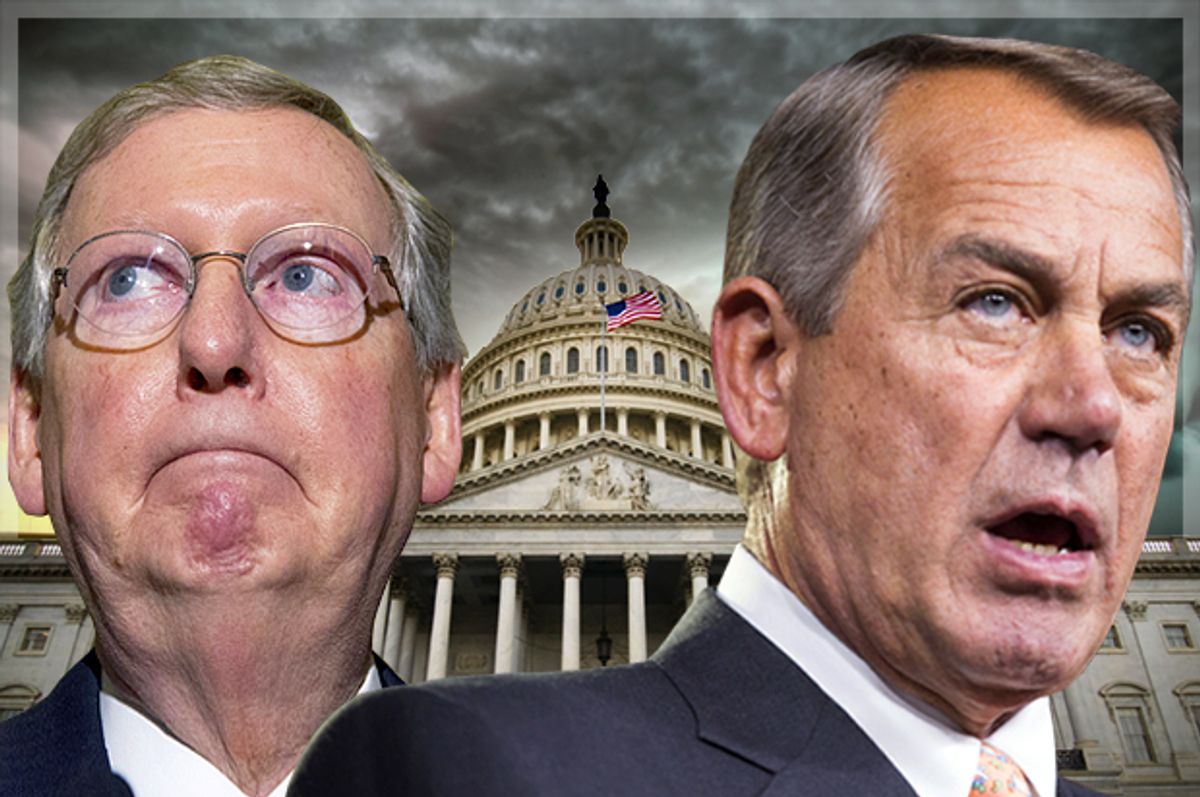The Tea Party's heist of the race for speaker of the House occurred at a bizarrely contradictory time in the movement's history. Even though the Freedom Caucus appears to be wagging the GOP dog with as much zeal as ever, the latest Gallup poll indicates a trend toward its political death.
The percentage of Americans who identify as tea party "supporters" has dropped from 32 percent during its 2010 high-water mark to 17 percent now. Among conservative Republicans, support for the Tea Party has dropped 21 points from 63 percent to 42 percent, with support from Republican leaners declining from 52 to 23 percent. The trend is obviously hilarious given how this faction continues to lead the broader GOP around by its short hairs.
The Tea Party's growing unpopularity with voters is ultimately good news for the political discourse given how its leadership operates on substance-free inchoate rage and cynicism, the likes of which have been skewing the debate into the very tall and very nonsensical weeds. But as long as the GOP remains inextricably grappled to this monster it helped to manufacture, it will continue to suffer from hilariously low congressional approval numbers (9 percent according to a recent Rasmussen study).
The bigger question is whether the GOP will continue to allow itself to be dominated by the Freedom Caucus, given how Tea Party support appears to be on a trajectory leading directly into the toilet. While it'd make perfect sense for GOP leadership and donors to begin withdrawing electoral support from extremists who seem to be fading as the Obama years draw to a close, it might be too late for the Republicans to pull out of their death spiral. Knowing how badly the congressional GOP was man-handled by the Freedom Caucus this month, it's safe to assume Republican leadership won't be divorcing itself from this shrieking gaggle of former backbenchers who now wield a disproportionately large degree of power -- enough to force Speaker Boehner out and to completely scramble the campaign for his replacement.
The only real explanation is that the Republicans wanted a piece of the Tea Party action in advance of the 2010 midterms, when the movement was surging in popularity. Its empowering of the Tea Party was clearly a phenomenal blunder. Now that it's elevated this gaggle of empty suits to control the party's destiny, there's no simple way to cram these weirdos back into their boxes.
What specifically went so haywire?
Party leadership didn't appear to anticipate the corrosive power of Tea Party's slow-motion coup d'etat of the GOP, culminating in the flummoxing of the speaker race. By the time the RNC and the GOP caucus realized what it'd gotten itself into, sometime around the unseating of party celebrities like Eric Cantor, it was too late. Once again, the GOP traded short-term political gains for long-term headaches, not unlike Karl Rove's political calculus during the Bush years, leading in part to the Iraq War -- a plan that was partly intended to help re-elect Bush in 2004, but which eventually helped to doom his legacy.
The loudness and temporary popularity of the Tea Party during its 2009-2010 prime was perceived by the establishment GOP as golden ticket to longer-term success, and the 2010 midterms seemed to confirm it, even though structural factors were equally significant in delivering the House to Republicans. The GOP, backed by Fox News and the conservative press, assumed the tea party represented the future of the party, combining conservative orthodoxy with grassroots support from "the folks."
In other words, the GOP's love affair with an attractive new political movement gradually devolved into an ugly marriage. Now, even as the movement's popularity wanes, it has nonetheless managed to bring the establishment down with it, devaluing the brand and opening the door for outsiders like Donald Trump and Ben Carson.
The Tea Party has never really cared about coalition-building or compromise, both necessities of, you know, actual governance. Instead, it's all about political domination, even though, to the rest of us, its positions seem incoherent and contradictory.
There's little chance at this point for voters to exile the Tea Partiers, since voter penchant for re-electing incumbents remains solid and gerrymandering following the 2010 congressional blowout has delivered many districts safely into the hands of the GOP's right flank. So, at least for now, even as they maintain an iron grip on Congress, Republicans remain hamstrung by a group of fringe lawmakers who've made it impossible to govern. In spite of the Tea Party's dwindling popularity, the new paradigm in congressional politics won't easily facilitate a jettisoning of the movement any time soon, at least without serious repercussions.

Shares